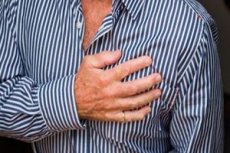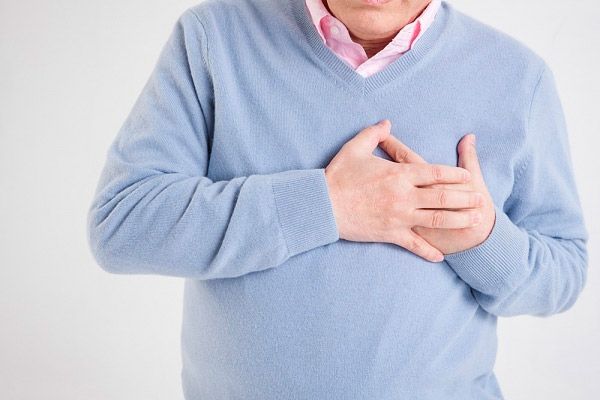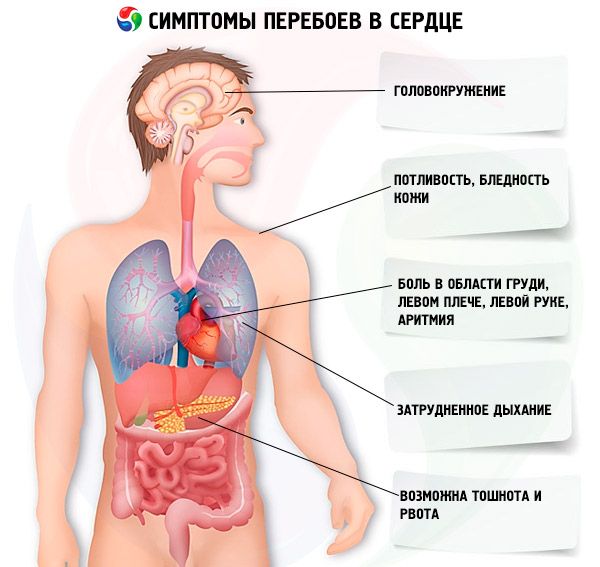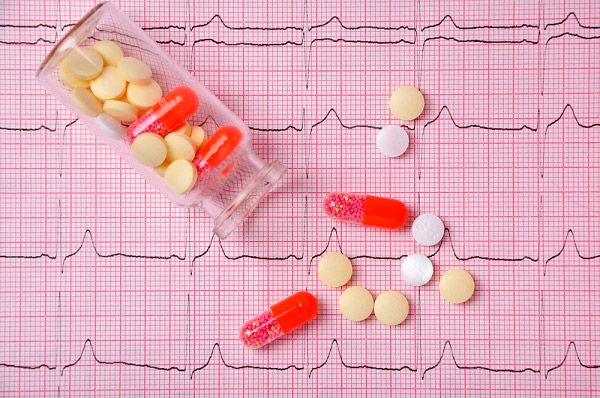Medical expert of the article
New publications
Heart palpitations
Last reviewed: 04.07.2025

All iLive content is medically reviewed or fact checked to ensure as much factual accuracy as possible.
We have strict sourcing guidelines and only link to reputable media sites, academic research institutions and, whenever possible, medically peer reviewed studies. Note that the numbers in parentheses ([1], [2], etc.) are clickable links to these studies.
If you feel that any of our content is inaccurate, out-of-date, or otherwise questionable, please select it and press Ctrl + Enter.

Heart rhythm disturbances or arrhythmia are perceived as interruptions in the heart's work, which are manifested by acceleration or, conversely, slowing of the pulse. Unpleasant sensations arise, causing anxiety...
Are irregular heartbeats dangerous? It depends on what they are associated with, because arrhythmia may not only be physiological. Very often, irregular heartbeats indicate the presence of certain pathologies of a cardiovascular, endocrine or neurocirculatory nature.
Causes heart palpitations
In cardiology, the key causes of cardiac arrhythmia are associated with disturbances in the normal sequence of electrical impulses in the heart, circulatory problems, or structural changes in the heart.
In turn, the causes of interruptions in the work of the heart in healthy people, which are manifested by physiological tachycardia, are associated with increased physical activity, fever, increased air temperature, rapid change of body position, as well as with anxiety, stress or neurotic state (when the sympathetic nervous system under the influence of adrenaline and cortisol affects the sinus node of the heart). Also, interruptions in the work of the heart can be a side effect of some medications (diuretics, antibacterials, antipsychotics). Even drops for a runny nose (for example, Galazolin) can cause interruptions in the heart. Smoking and abuse of caffeine also contribute.
People with iron deficiency anemia, increased functional activity of the thyroid gland (hyperthyroidism), and autoimmune thyroiditis often experience interruptions in the work of the heart. Causes of atrial fibrillation, in addition to dysfunction of the thyroid gland, include high blood pressure, diabetes, chronic lung diseases, alcoholism.
Cardiologists include the following causes of rapid and chaotic interruptions in the heart's work - ventricular fibrillation, the consequences of which can lead to cardiac arrest: damage to heart tissue during myocardial infarction; myocarditis and cardiosclerosis; decreased blood supply to the myocardium due to narrowing of the coronary artery (developing due to high cholesterol levels in the blood); congenital structural abnormalities of the heart, including valve defects, myocardial dystrophy, etc.
But extrasystole - in the absence of organic changes in the heart muscle - is considered by experts to be a harmless reflex reaction of the autonomic nervous system, which regulates, among other things, the heart rate. This is the pathogenesis of interruptions in the heart's work in VSD (vegetative-vascular dystonia).
Changes in the electrolyte balance of the blood towards an increase in its acidity level, as well as excessive insulin intake when consuming large amounts of food or foods rich in carbohydrates and fats, explain interruptions in the work of the heart after eating, in particular, increased heart rate. In addition, products with a high content of sodium glutamate and nitrates may be to blame.
Among the factors that cause interruptions in the work of the heart during pregnancy, doctors highlight the hormonal changes characteristic of this condition; increased load on the heart due to an increase in the volume of circulating blood; problems with intestinal motility, as well as loss of fluid during vomiting during early toxicosis.
Often, interruptions in the work of the heart occur with osteochondrosis, which is associated with the pinching of the nerve roots by intervertebral discs, which leads to vegetative disorders.

 [ 4 ]
[ 4 ]
Pathogenesis
When the pathogenesis of cardiac arrhythmia is related to its electrical system, we are talking about malfunctions in the sinus node (the heart's natural pacemaker, containing the most active electrical cells and initiating the heartbeat) or the atrioventricular (atrioventricular) node, responsible for transmitting signals from the atrium to the ventricles. Most often, this is what causes interruptions in the heart's work: the heartbeat may become too fast or too slow, it may be chaotic or stable. Symptoms vary depending on the rhythm changes, and doctors may note the presence of:
- sinus tachycardia (increased heart rate to 90-100 or more beats per minute);
- supraventricular tachycardia (which begins in either the lower or upper chambers of the heart);
- atrial fibrillation (instability of heart rhythm);
- bradycardia (decrease in heart rate below 60 beats per minute);
- sick sinus syndrome (when the pacemaker does not work properly and the heart rate slows down and speeds up);
- sinus arrhythmia (cyclical changes in heart rate during breathing, common in children and adults);
- extrasystole (extra myocardial contraction);
- ventricular fibrillation.
 [ 5 ]
[ 5 ]
Symptoms heart palpitations
While some heart rhythm disturbances may go unnoticed, others cause varying degrees of symptoms of irregular heartbeat, ranging from mild chest discomfort to shortness of breath and loss of consciousness (syncope).
As a rule, the first signs of interruptions in the work of the heart are noticed by acceleration or deceleration of the pulse, as well as by the feeling of the heart stopping for a split second.
In addition, patients complain of attacks of severe heart palpitations, a short-term deterioration in general health, accompanied by dizziness and a feeling of sudden weakness.
With tachycardia, there may be a feeling of slight trembling (fluttering) in the heart area, as well as squeezing or pulling pain. In more severe cases, there may be a feeling of shortness of breath and fear. The most likely complications are associated with the risk of coronary heart disease and heart attack.
In bradycardia, which people feel as interruptions in the heart's work at rest, weakness of the sinus node may be detected, which is symptomatically manifested by a decrease in heart rate, a failure of the respiratory rhythm and a semi-fainting state. Complications include cerebral ischemia and cardiac arrest. In the case of extrasystole, strong points are felt in the heart, and in the case of atrial fibrillation (which most often affects people over 50), severe shortness of breath and syncope are added to all the listed symptoms.
The symptoms that distinguish cardiac irregularities in VSD depend on the nature of the vegetative-vascular disorder. If it is associated with the release of adrenaline into the bloodstream, then the heart rate increases sharply, the person turns pale, he or she is either hot or shivery. And when the level of insulin in the blood increases, the heart rate drops, the pulse weakens, and the person breaks out in a cold sweat.

Interruptions in the work of the heart after eating can be accompanied by increased sweating, yawning and discomfort in the abdomen.
Where does it hurt?
Diagnostics heart palpitations
Like any diagnosis, the diagnosis of cardiac arrhythmia, as a manifestation of symptoms of a certain pathology or neurotic condition, begins with anamnesis, measurement of pulse rate and auscultation of the heartbeat with a stethoscope.
Usually, tests are taken - general and biochemical blood analysis.
And basic instrumental diagnostics of these conditions includes:
- ECG (electrocardiography);
- 24-hour ECG recording (continuous 24-hour monitoring of the heart using a portable recorder using the Holter method);
- echocardiography (ultrasound of the heart);
- treadmill test (recording ECG, pulse rate and blood pressure level during physical exertion).
In atrial fibrillation, a special study of the heart's function may be performed using intraesophageal echocardiography (a catheter-sensor is inserted into the area of the heart through the esophagus) to determine the source of the aberrant heartbeats.
 [ 6 ]
[ 6 ]
What do need to examine?
How to examine?
What tests are needed?
Differential diagnosis
To identify the specific cause of cardiac irregularities, a thorough differential diagnosis of cardiac pathologies, endocrine diseases, circulatory disorders and the autonomic nervous system is necessary.
Who to contact?
Treatment heart palpitations
It is clear that the treatment of cardiac arrhythmia will depend on the nature and causes of the cardiac arrhythmia, as well as its severity. Physiological tachycardia and sinus arrhythmia do not require therapy.
In drug treatment prescribed by doctors, various medications are used:
- β1-adrenergic receptor blockers that reduce the force of contraction of the heart muscles and heart rate (Metoprolol, Propranolol, Atenolol, etc.);
- cardiac output reducing Na+ channel blockers (Quinidine, Disopyramide, Allapinin);
- calcium channel blockers acting on the sinoatrial and atrioventricular nodes (Verapamil, Diltiazem).
The adrenergic blocker Metoprolol (other trade names: Vasocardin, Carvedilol, Egilok) is effective in supraventricular tachycardia and ventricular extrasystoles. The standard dosage for irregular heartbeats is one tablet (0.05 g) twice a day, the maximum daily dose is 0.2 g. Side effects of this medication include decreased blood pressure, soft tissue swelling, shortness of breath, skin rashes, gastrointestinal disorders, blood supply to the extremities and sleep, cramps, joint pain, and changes in blood count. Metoprolol is contraindicated in cases of sinus node weakness, bradycardia, hypotension, severe heart failure, and circulatory disorders; the drug is not prescribed during pregnancy and lactation.
The antiarrhythmic drug Allapinin (in tablets of 25 mg) should be taken one tablet (pre-crushed) 3-4 times a day, half an hour before meals. Possible side effects of the drug are dizziness and double vision, and among the contraindications to its use are blockade of the conduction of impulses by the cardiac conduction system, circulatory disorders and kidney and liver function.
Quite often, treatment of irregular heartbeats is carried out with the antiarrhythmic drug Verapamil (Veracard, Isoptin, Kaveril), which is recommended to be taken 40-80-120 mg three times a day (the individual dosage is determined by the doctor). This drug can cause nausea, vomiting, diarrhea, decreased blood pressure, headache and dizziness, bleeding gums. The use of Verapamil can disrupt liver function, cause fainting, sleep disorders, urination, menstrual cycle and provoke an attack of angina and myocardial infarction. Among its contraindications: hypotension, bradycardia, severe heart failure, sick sinus syndrome, atrial fibrillation and atrial flutter. The drug is not prescribed to children under 5 years of age and pregnant women. It should also be borne in mind that Verapamil, when taken with beta-blockers, increases the risk of dysfunction of the sinoatrial and atrioventricular nodes, and is never used simultaneously with sodium channel blockers and neuroleptics. The drug should not be taken with grapefruit juice.

The digitalis drug Digoxin is a cardiac glycoside and helps to reduce heart rate in tachycardia. It is prescribed strictly according to indications in an individually established dosage and is used under ECG control in a hospital setting.
Depending on the results of the examination and the established diagnosis, diuretics, anticoagulants, sedatives, etc. may also be prescribed. Doctors recommend taking all B vitamins, vitamins A, E, C and PP, lecithin, and, in case of tachycardia, magnesium preparations.
Considering the degree of danger of interruptions in the work of the heart, physiotherapeutic treatment of cardiac arrhythmia is carried out selectively, since in case of structural changes in the myocardium such treatment is contraindicated.
Most often, physiotherapy – in the form of electrophoresis sessions with potassium chloride or Propranolol – is used if patients have interruptions in the functioning of the heart due to VSD (neurocirculatory dystonia).
Physiotherapists recommend electrophoresis with bromine, oxygen therapy and electrosleep sessions, as well as balneological procedures (carbon dioxide, nitrogen and radon baths) to restore normal heart rhythm.
In case of chronic interruptions in the heart, surgical treatment can be performed according to indications, which consists of cauterization of certain pathologically active zones of the myocardium using the radiofrequency ablation method. In case of decreased heart rate and pathologies of the natural pacemaker of the heart, an operation is performed to install a pacemaker.
Folk remedies
What does folk treatment for irregular heartbeat offer? First of all, you need to treat with natural honey: consume a tablespoon of honey every day for one month. You can mix honey with lemon juice (2:1), or simply drink tea with honey (preferably in the evening).
The next method involves the use of copper applications, which uses copper plates that are recommended to be placed in the collarbone area for at least 5-6 hours a day.
It is also recommended to take fish oil containing unsaturated omega fatty acids: 1 g per day for 30-40 days.
For those who prefer herbal treatment, herbalists advise:
- prepare a decoction of motherwort herb (a tablespoon per 200 ml of water) and take it one tablespoon 3-4 times a day;
- take a decoction of peppermint (a dessert spoon per glass of boiling water) - a tablespoon three times during the day.
In the same way, for increased heartbeat, you can use a decoction of valerian roots and rhizomes, astragalus licorice and catnip, as well as hawthorn fruits. You can also use a pharmacy alcohol tincture of hawthorn - 18-20 drops twice a day (the second dose in the evening).
 [ 7 ]
[ 7 ]
Homeopathic Treatment for Heart Problems
By the way, homeopathy also has among its remedies for irregular heartbeats a tincture of hawthorn - Crataegus drops. These drops are taken twice a day on a piece of sugar (seven drops), which should be kept in the mouth until the sugar dissolves.
The most recommended homeopathic remedies for arrhythmia are: Cactus grandiflorus drops (20 drops twice daily 25 minutes before meals, may cause diarrhea); Aconitum D4 (tincture of the poisonous plant monkshood); Lilium tigrinum (tincture of tiger lily); Calcarea carbonica (calcium carbonate, taken in triple dilution once a week); Gnaphalium polycephalum 3X, HPUS (granules of marsh cudweed for sublingual use); Spigelia D2 (tincture of the plant anthelmintic); Naia tripudens D12 (venom of the spectacled cobra).
Homeopathic doctors remind that irregular heartbeats can be a sign of serious cardiac pathologies, so homeopathic remedies are not intended to replace standard medical methods of treating arrhythmia and should be used as an addition to allopathic methods of treatment. They should not be used without a doctor's recommendation.
Prevention
The main prevention of heart rhythm disorders is a healthy, i.e. active lifestyle, consumption of dairy and plant foods with vitamins, calcium, potassium, iron and especially magnesium. If you are prone to arrhythmia, you should avoid any overloads, sleep at least 7-8 hours, walk more, and also exclude alcohol and smoking.
Forecast
The prognosis for physiological tachycardia in healthy people is favorable. But with obvious heart pathologies, interruptions in its work pose a considerable danger.
Every day, the heart beats an average of 100,000 times, pumping more than 750 decalitres of blood. When the heart is not beating rhythmically, the brain and all other organs cannot function properly.
If you experience irregularities in your heart's work, you should seek help from a cardiologist so that timely diagnosis and effective treatment - combined with proper prevention - can help prevent pathological consequences of heart rhythm disturbances that are dangerous to human health and life.

